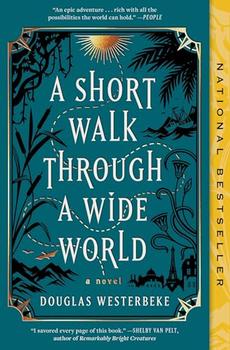Summary | Excerpt | Reading Guide | Reviews | Beyond the Book | Readalikes | Genres & Themes | Author Bio

A Novel
by Douglas Westerbeke
A new pain, a vulture in her womb digging itself out. She doubles over and falls to her knees. In one terrible cough, she sprays so much blood on the ground that the crowds swarming around her gasp in unison and back away.
Her hat falls off and her walking stick clatters to the ground. She tries to control her breathing—carefully, because even the smallest breath tempts the gag in her throat. She picks up her walking stick, hugging it close to her chest. She leaves the hat. The hat is not important. She can get a new hat. She climbs to her feet, wipes her mouth, approaches the men in the boats by the shore, unloading fish, selling melons and plantains. They see her coming, see the blood, the stagger. They'd flee but they're trapped against a logjam of boats.
"Je dois avoir un bateau, s'il vous plait…" she says.
Some of the fishermen point. Some shoo her away. It's not like anything they've seen before, this sickness. She stumbles along the shore and the crowd parts before her.
"Someone… please…"
She trembles, her own little earthquake. People scramble up the riverbank to get out of her way. Some choose to flee into the river, up to their knees in mud, up to their thighs in water. Now there are no more people in front of her and she's standing on a dock that extends past the boats and into the river.
A ferryboat full of people has just cast off, chugging upstream, clouds of thick black smoke from its funnel. Over the noise of the engine is that same voice, the shout of a little girl.
"Come here! This way!"
She looks and sees two blond-haired children in white—in white of all things, a perfect lambswool white—waving to her from the stern of the boat.
"Here!" they shout. "We'll help you!"
She tucks the book into her sash, wobbles, and almost falls over again, but she focuses and fights her pain and untaps the last of her strength. She runs the length of the dock, clutching her walking stick in her hands. She runs and when she reaches the end, she doesn't stop or slow down, but leaps into the muddy river. She leaps and swims with all the power she has left to catch that ferry with the powerful steam engine. And everyone in the marketplace rushes to the shore to watch.
The crowd holds their breath and the children egg her on. She swims and swims and she manages to catch up to that ferry before it can find its speed, all the while her walking stick in one hand, her bag dragging behind her. The people on the ferry, amazed by this feat, reach down and lift her up by the arms and pull her into their boat.
Then she is sprawled on the deck, sopping wet, in a puddle of river water and diluted blood. She clutches her walking stick tight to her body, the way monks clutch their prayer beads. She looks up at her rescuers, her fellow travelers. Panting, she asks them, "Oh, mon dieu… Are we moving? Are we underway?"
The two children, a boy and a girl, stare down at her, and their father, too, a big vault of a man with a New Zealand accent, kneeling beside her. He says, "Yes, yes. We're moving."
Relief. Reprieve. No more blood, not from her nose, her lips, or her ears. The pain has already faded away. She can breathe again.
"Dieu merci, " she tells them and smiles. "I am aweigh."
Excerpted from A Short Walk Through a Wide World by Douglas Westerbeke. Copyright © 2024 by Douglas Westerbeke. Excerpted by permission of Avid Reader Press. All rights reserved. No part of this excerpt may be reproduced or reprinted without permission in writing from the publisher.
Your guide toexceptional books
BookBrowse seeks out and recommends the best in contemporary fiction and nonfiction—books that not only engage and entertain but also deepen our understanding of ourselves and the world around us.